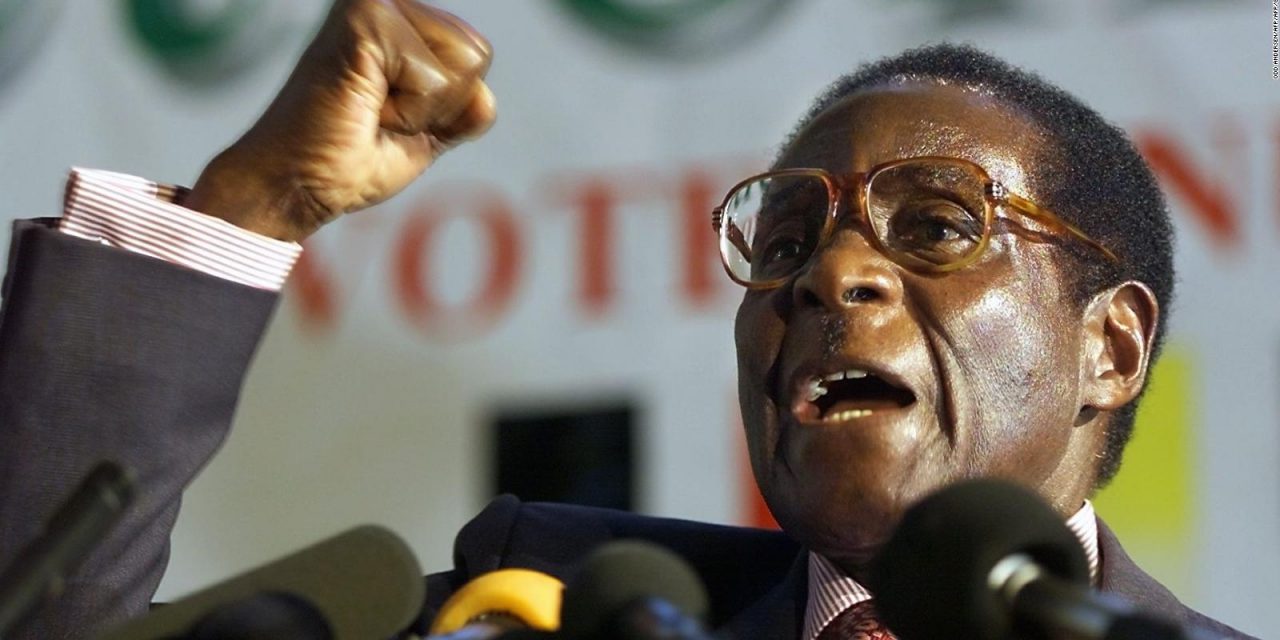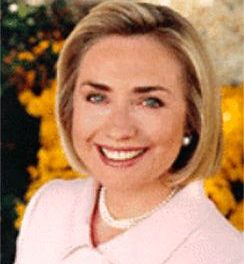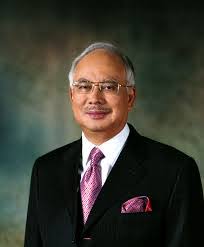22 November 2017
Robert Mugabe resigned as President yesterday.
Corruption in Zimbabwe has become endemic within its political, private and civil sectors. Zimbabwe ranks 154th out of 176 countries in the 2016 Transparency International Corruption Perceptions Index. In 2008, a Transparency International director announced that Zimbabwe loses US$5 million to corruption every day.
Zimbabwe is heavily dependent on exports of tobacco, gold, diamond and platinum.
President Robert Mugabe has been in power for 36 years and is the longest surviving head of state. A British historian, Lord Acton, once wrote ‘Power tends to corrupt; absolute power corrupts absolutely’. This is what happened to Mugabe.
In 2000, Mr Mugabe launched land reform which aimed at violent takeover of white-owned farms, then the backbone of the country’s agricultural sector. The seized land was given to black farmers who lacked experience with modern agricultural practice. The farmers were chosen based on their connections to Mr Mugabe and his party. General Chiwenga enriched himself during this reform by acquiring choice lands for himself.
Mr Mugabe having embroiled Zimbabwe in Congo’s civil war. His central bank started to print money to pay off debts and compensate war veterans. This resulted in hyperinflation in Zimbabwe. At one point in 2008 inflation hit the rate of 231,000,000%. In 2008, the government announced a new Zimbabwean dollar, with 10 zeros removed. The Z$10 billion would be redenominated to be Z$1. In 2015 Zimbabwe made the Chinese yuan their main reserve currency and legal tender after China cancelled $40 million debts.
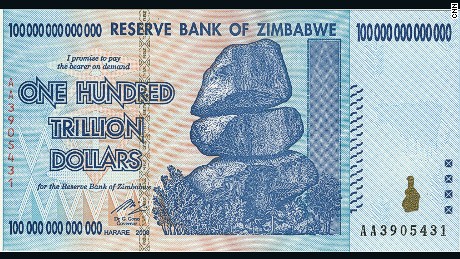
100 trillion dollar note
A quarter of Zimbabweans are currently in need of food assistance and 72% live in poverty. Within a generation, Mr Mugabe has managed to wreck Zimbabwe.
On 6 November 2017, Mugabe sacked his vice-president, Emmerson Mnangagwa, lifelong aide and a liberation war veteran, who fled to South Africa. He did this on the instigation of his wife who wanted to take over as Vice President and finally to succeed Mugabe as president. Mr Mnangagwa said that he fled to South Africa because his security guards had warned him of plans to “eliminate” him, after he was sacked.
Grace became Mugabe’s mistress while she was working for him as a secretary. Both were married at that time. She had two children, Bona, Robert Peter before their marriage. After Mugabe’s terminally ill wife died, the couple were married in an extravagant Catholic Mass. At that time of the marriage Grace Mugabe was 31 and Robert Mugabe was 72 years old. In 1997, she gave birth to the third child, Chatunga Mugabe.
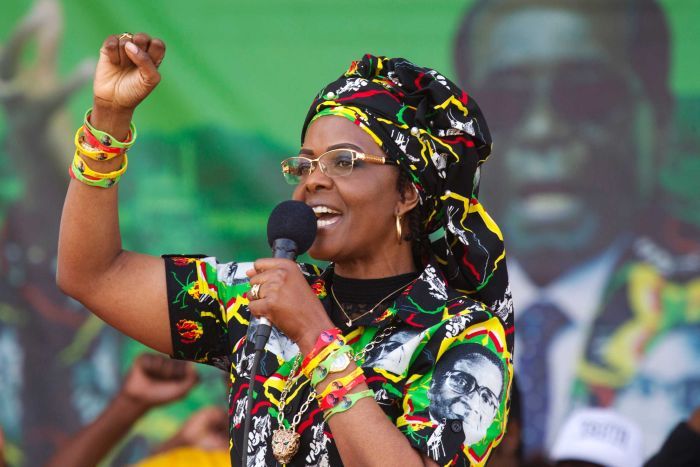
Grace Mugabe
She became head of the ZANU-PF Women’s League. After that, she became politically ambitious. Then she became a member of the ZANU-PF Politburo. In late 2014, Grace Mugabe was critical of the then Vice-President, Joice Mujuru, and managed to eliminate her as a candidate to succeed Mugabe by ousting her from the vice-presidency. She carved one of the party’s secretive factions, the G40, for herself while the other faction, Lacoste, was led by the Vice-President Emmerson Mnangagwa. Their rivalry started here. She wanted to be the vice president. For her to achieve her ambition Mnangagwa must go. She employed the same tactics she used on Joice Mujuru, to oust Emmerson Mnangagwa. But, it back-fired.
On 13 November 2017, Army general and Commander of the Zimbabwe Defence Forces, General Constantino Chiwenga, released a press statement chastising those who were responsible for the dismissals of government officials in the ruling ZANU-PF party. He warned that the armed forces would be forced to intervene should the “purging” not stop. ZANU-PF’s spokesperson released a press statement accusing Chiwenga of “treasonable conduct”.
On 14 November soldiers and armoured military vehicles blocked several roads in the city and the one leading to President Robert Mugabe’s private residence, ‘Blue Roof’, valued at $9 million, as well as one leading to the ZANU-PF aligned national broadcaster, Zimbabwe Broadcasting Corporation (ZBC).
General Chiwenga on 10 November 2017 met Chinese Defence Minister Chang Wanquan in China. He must have got tacit approval of the Chinese government for the intended coup.
Mugabe, 93, is now under house arrest. He has refused to step down. Several senior officials are said to have been detained since Wednesday. Former vice president, Emmerson Mnangagwa, is expected to return to Zimbabwe. The country’s former opposition prime minister Morgan Tsvangirai has returned from South Africa for “negotiations”.
Zimbabwe’s envoy to South Africa, Isaac Moyo, explicitly said there was no coup as the government was “intact” with no “military takeover”.
“We are only targeting criminals around [President Mugabe] who are causing social and economic suffering,” Mr Moyo, army spokesperson, said on state TV. “As soon as we have accomplished our mission, we expect that the situation will return to normalcy.”
Zimbabwe’s Herald newspaper published photos, taken after the coup, showing a smiling Mr Mugabe sitting in an armchair wearing a suit and tie, along with military commander General Chiwenga.
President Mugabe has conferred degrees on students at a university in the capital, Harare, in his first public appearance since he became a prisoner of the military. Zimbabwe’s state broadcaster has tweeted photos of the event. At the convocation ceremony, General Chaweng’s wife received her certificate for the MBA course she followed in the university.
The military has been very kind to him.
Military had no ambition in taking control of the power but wanted to have an acceptable person to succeed Mugabe. Emmerson Mnangagwa is acceptable to the military.
(Mugabe’s) ZANU PF Party chiefs have relieved Mugabe from the post he held in the party. After the party started impeachment proceedings Mugabe resigned as President yesterday. He did not mention a successor. Emmerson Mnangagwa will be sworn in as the new Zimbabwe president on Friday. He is expected to return to Zimbabwe today.
Chinese foreign ministry spokesman Lu Kang said that China respects Robert Mugabe’s decision to resign, adding that his country’s policy toward Zimbabwe would not change. United States called for free and fair elections in Zimbabwe. UK also welcomed the resignation.
Although Mugabe, a liberation hero turned a despot, was unpopular, Vice president Emmerson Mnangagwa and army chief Chiwenga managed to keep him in power.
After the 2002 elections, journalists were driven out of their homes and jobs, newspapers were shut down and opposition voices fled to South Africa and elsewhere. These atrocities happened while Mnangagwa was Mugabe’s strongman. Mnangagwa is a mini-Mugabe. He was Mugabe’s security chief during the 1980s when the Matabeleland massacres took place. We do not know whether this Mnangagwa-Chiwenga alliance will bring a new era of freedom or a transition from one dictatorship to another. Both Mnangagwa and Chiwenga are ruthless men. They had been his close allies, advisors, co-conspirators and executioners.
Normally after a coup, a transitional government is appointed. The task of the transitional government is to hold a general election as soon as possible and to lead the country into a democracy. But Chiwenga does not want any of these. He felt that his position as army chief was threatened by Grace Mugabe becoming vice president and eventually succeeding Mugabe. To maintain status quo and his position safe, he approached his ally to head the transitional government. It is unlikely that any election will be held soon after the departure of Mugabe.
In 2008, when Mugabe lost elections to his main rival, Morgan Tsvangirai, and was going to accept defeat, Chiwenga told Mugabe: ‘We can’t lose elections. We can’t hand power to the MDC. We are going to obliterate them’. He manoeuvred, and the security forces attacked opposition supporters around the country, beating, raping and killing. After a long delay, the rigged official results were announced in very ambiguous terms, saying that Mr Tsvangirai had not gained the 50% required for victory and so a second round was needed. Mugabe remained in power. Tsvangirai refrained from participating in the second round because the was so much violence in the interim period. So, Mugabe won the second round by an overwhelming margin. For the 2013 elections, the electoral roll was tampered with. One million fictitious voters were added, some dead and some exceeding 120 years of age. One million real voters were excluded from the electoral roll.
In the early 1980s, while in staff college, he bribed a junior officer to give him answers for practical Intermediate Staff Course. He accepted a green coded paper with suggested solutions which are available only after the exam.
Chiwenga is still under sanctions from the European Union and the US – for his role in a brutal crackdown on the opposition, and over the seizure of white-owned farms.
South Africa, Zambia and Tanzania are scheduled to meet at a summit in Angola to discuss Zimbabwe’s political crisis.
The whereabouts of the first lady Grace Mugabe is not known. According to the army she was held under house arrest along with her husband. At least 50 of her closest allies have left the country.
Zimbabwe’s problems can be fixed quickly because of the vast reserves of gold, platinum and diamonds. For this, the country needs good leadership and not kleptocracy.

